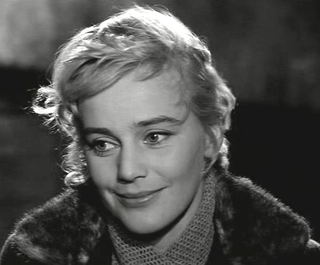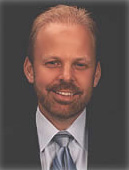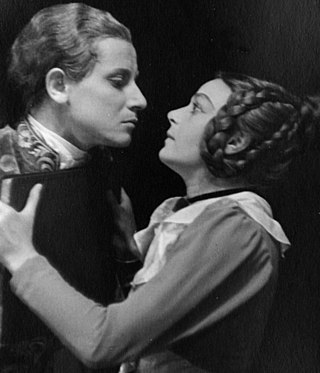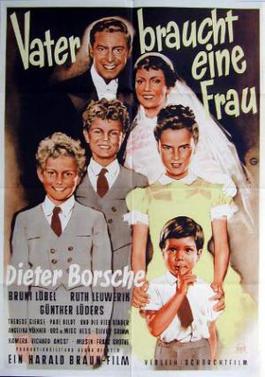
Maria Margarethe Anna Schell was an Austrian-Swiss actress. She was one of the leading stars of German cinema in the 1950s and 1960s. In 1954, she was awarded the Cannes Best Actress Award for her performance in Helmut Käutner's war drama The Last Bridge, and in 1956, she won the Volpi Cup for Best Actress at the Venice Film Festival for Gervaise.

Christian Medical College, Vellore, widely known as CMC, Vellore, is a private, Christian minority community-run medical college and hospital in Vellore, Tamil Nadu, India. This institute includes a network of primary, secondary and tertiary care hospitals.

Washington Square is a novel written in 1880 by Henry James about a father's attempts to thwart a romance between his naive daughter and the man he believes wishes to marry her for her money. The novel was adapted into a play, The Heiress, which in turn became an Academy Award-winning film starring Olivia de Havilland in the title role.

The Citadel is a 1983 BBC television adaptation written by Don Shaw from A. J. Cronin's 1937 novel The Citadel. It was produced by Ken Riddington. The drama was directed by Peter Jefferies and Mike Vardy.

Robert Oldham Young is an American naturopathic practitioner and author of alternative medicine books promoting an alkaline diet. His most popular works are the "pH Miracle" series of books, which outline his beliefs about holistic healing and an "alkalarian" lifestyle. Young came to prominence after appearances on The Oprah Winfrey Show featured his treatment of Kim Tinkham for breast cancer. Tinkham and Young both claimed that he had cured her, but she died of her disease shortly afterward. He was arrested in January 2014 and convicted in 2016 on two out of three charges of theft and practicing medicine without a license. He spent several months in jail in 2017.

Auguste Deter was a German woman notable for being the first person to be diagnosed with Alzheimer's disease.

Carl Sebastian Martin Wery was a German actor.

Marianne Koch is a German actress of the 1950s and 1960s, best known for her appearances in Spaghetti Westerns and adventure films of the 1960s. She later worked as a television host and as a physician.

The Black Abbot is a 1963 West German mystery film directed by Franz Josef Gottlieb and starring Joachim Fuchsberger. Adapted from the 1926 novel of the same name, it was part of a very successful series of German films based on the writings of Edgar Wallace.

Albert Eugen Rollomann, better known as Dieter Borsche, was a German actor. He appeared in more than 90 films between 1935 and 1981. Since 1944, he suffered from muscle atrophy and had to use a wheelchair since the late 1970s. He was born in Hanover, Germany and died in Nuremberg, Germany. Borsche became a film star after World War II following his performance in Keepers of the Night (1949).

The Last Bridge is a 1954 Austrian-Yugoslavian war drama film directed by Helmut Käutner and starring Maria Schell, Bernhard Wicki and Barbara Rütting. It tells the story of a German nurse who is captured by Yugoslav partisans, and with her devotion to medical duty finds herself with divided loyalty to both sides of the conflict. The film was entered into the 1954 Cannes Film Festival.

Dreaming Out Loud is a 1940 American film based on the radio series Lum and Abner, directed by Harold Young starring Chester Lauck and Norris Goff. It is also known as Money Isn't Everything.

They Came to Blow Up America, also known as School for Sabotage and School for Saboteurs, is a 1943 American war spy film directed by Edward Ludwig and starring George Sanders and Anna Sten. It is based on the World War II Operation Pastorius.

The Girl from the Marsh Croft is a 1935 German drama film directed by Detlef Sierck and starring Hansi Knoteck, Ellen Frank and Eduard von Winterstein. It was adapted from the 1908 novel The Girl from the Marsh Croft by Nobel Prize winning Swedish author Selma Lagerlöf. It has been described as a "prototype Heimatfilm. It was remade in 1958.

The Rose Garden is a 1989 American drama film directed by Fons Rademakers and written by Paul Hengge. The film stars Liv Ullmann, Maximilian Schell, Peter Fonda, Jan Niklas, Hanns Zischler, Alma Almagor as Ruthi and Kurt Hübner. The film was released on December 22, 1989, by Cannon Film Distributors.

The Great Temptation is a 1952 West German drama film directed by Rolf Hansen and starring Dieter Borsche, Ruth Leuwerik and Renate Mannhardt. It was made at the Bavaria Studios in Munich. The film's sets were designed by the art directors Franz Bi and Botho Hoefer.

Father Needs a Wife is a 1952 West German comedy film directed by Harald Braun and starring Dieter Borsche, Ruth Leuwerik and Bruni Löbel. It was made at the Bavaria Studios in Munich and on location around Lautersee and Mittenwald. The film's sets were designed by the art directors Hans Sohnle and Fritz Lück.

The Priest of St. Pauli is a 1970 West German drama film directed by Rolf Olsen and starring Curd Jürgens. Two years earlier they had made the similarly-themed The Doctor of St. Pauli together.

Ekhane Akash Neel is a Bengali romantic medical drama series that aired on Star Jalsha and streamed on the digital platform Hotstar from 23 September 2019. It was a reboot of the popular show Ekhane Aakash Neel. It was also the remake of the StarPlus show Sanjivani. Produced by Surinder Films, it starred Sean Banerjee as Dr. Ujaan Chatterjee and Anamika Chakraborty as Dr. Hiya Chatterjee. It ended on 3 October 2020 and was replaced by Ogo Nirupoma.
Christiane Northrup is a former obstetrics and gynaecology physician and author who promotes pseudoscientific alternative medicine and anti-vaccine conspiracy theories. She has a history of opposing vaccination and has embraced QAnon ideology during the COVID-19 pandemic. Northrup reaches a significant audience through popular books and multiple social media platforms and spreads misinformation, notably about COVID-19.



















